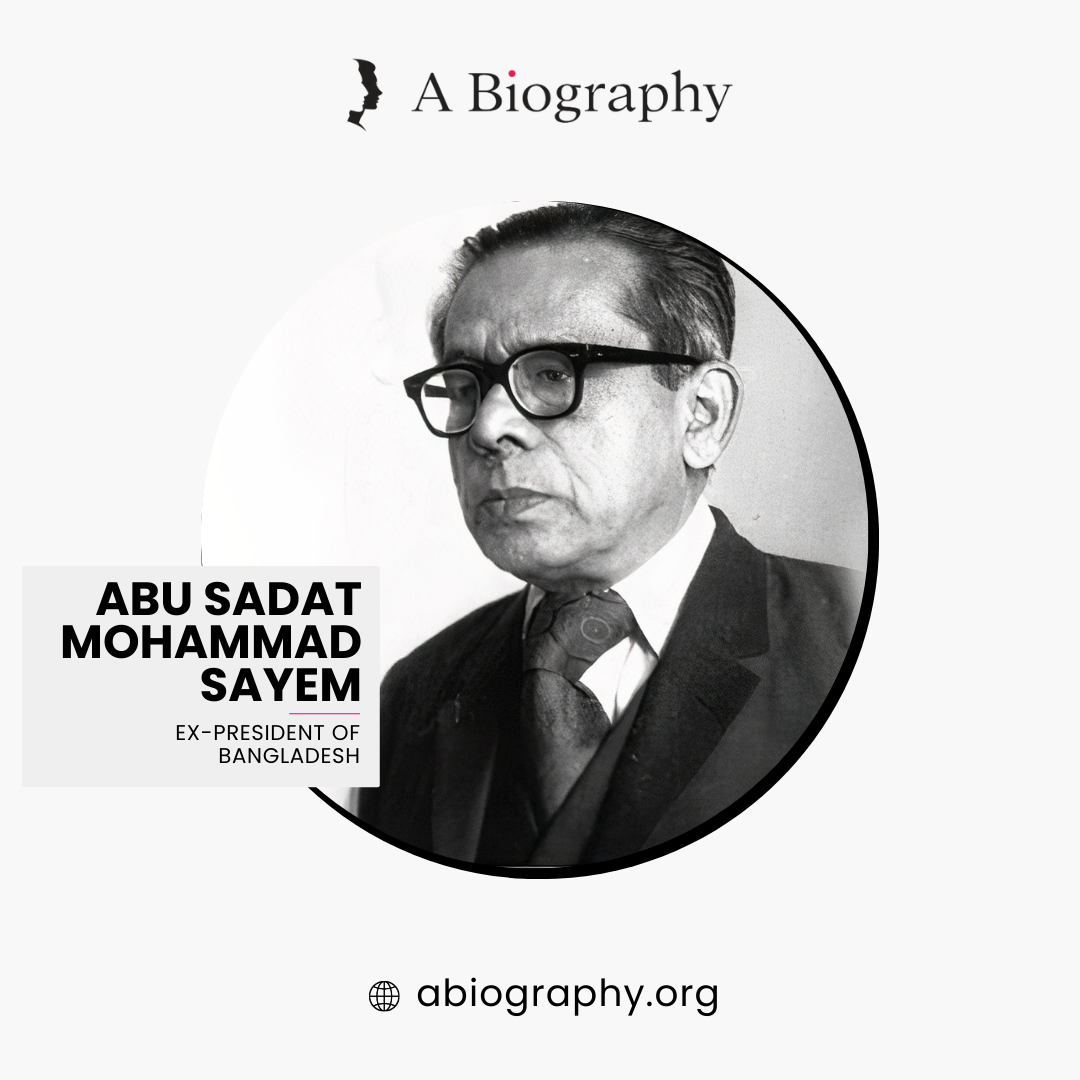A BIOGRAPHY OF ABU SADAT MOHAMMAD SAYEM
Abu Sadat Mohammad Sayem was a prominent Bangladeshi politician and statesman who served as the President of Bangladesh from 1975 to 1977. He was born on 29 March 1916, in Rangpur, Bengal Presidency, British India. Sayem completed his education in law and became a lawyer before entering politics. He was actively involved in the Language Movement, which fought for the recognition of Bengali as the official language of Pakistan. Sayem played a significant role in the liberation struggle of Bangladesh in 1971, and after the country gained independence, he served in various high-ranking government positions before assuming the presidency. As a respected leader, Sayem played an essential role in shaping the political landscape of Bangladesh during a critical period of the country’s history.
Table of Contents
ToggleLife Of “Abu Sadat Mohammad Sayem” At A Glanc
Known For: First Chief Justice of Bangladesh
Born: 29 March 1916
Age: 81
Birthplace: Rangpur district, Bangladesh
Nationality: Bangladeshi
Education:
Rangpur District School
Carmichael College
Presidency College
University Law College
Occupation:
Jurist
Statesman
President of Bangladesh
Chief Martial Law Administrator
Death: 8 July 1997
Early Life
Abu Sadat Mohammad Sayem was born on 29 March 1916 at Rangpur, Bengal Presidency, British India (now Bangladesh).
Education and Career
Abu Sadat Mohammad Sayem received his early education at Rangpur District School and Carmichael College. He pursued higher education at Presidency College in Calcutta and graduated from the University Law College of Calcutta University.
Sayem began his career as an advocate at the Calcutta High Court in 1944. Following the partition of India in 1947, he moved to Dhaka, East Bengal, Pakistan and became a member of the newly established Dhaka High Court. Additionally, he served as a junior advocate at the law firm Sher-e-Bangla AK Fazlul Huq, and was elected secretary and vice president of the Dhaka High Court Bar Association. Sayem was also a member of the East Pakistan Lawyers’ Association and held various positions, including Secretary, Secretary General, and Vice President.
In 1962, Sayem was appointed as a judge in the Dhaka High Court and also served on the Commission of Enquiry to investigate the causes of the exodus and eviction of minority communities in 1967. He later served on the Delimitation Commission, responsible for delimiting parliamentary constituencies, and on the Election Commission.
Following Bangladesh’s independence in 1971, Sayem was appointed as Chief Justice of the Bangladesh High Court on January 12, 1972. Upon the creation of the Bangladesh Supreme Court, he was promoted to Chief Justice of Bangladesh on December 17, 1972, and delivered a verdict on the important Berubari Case regarding the exchange of enclaves between Bangladesh and India.
Sayem assumed the position of President and Chief Martial Law Administrator on November 6, 1975, after the Bangladesh coup on November 3, 1975, led by Brigadier General Khaled Mosharraf. However, he resigned as Chief Martial Law Administrator on November 29, 1976, and was replaced by Major General Ziaur Rahman. Sayem resigned from the presidency of Bangladesh on health grounds on April 21, 1977.
Legacy
In addition to writing the book “At Bangabhaban: Last Phase” in 1988, he issued several significant legal rulings. One of his most noteworthy decisions pertained to the Berubari Case, which contested the transfer of the southern portion of the South Berubari union and neighboring enclaves to India in exchange for the Dahagram and Angarpota enclaves being handed over to Bangladesh, as stipulated in an accord signed by the leaders of both nations in May 1974. This verdict led to the Third Amendment to the Constitution, which was enacted to implement the agreement.
Sayem was a strong advocate for human rights and freedom of expression. He took a tough stance against corruption, and under his leadership, several high-profile cases of corruption were brought to justice. He also took steps to improve relations with neighboring countries, particularly India, with whom Bangladesh had a historically fraught relationship.
Sayem’s legacy is still felt in Bangladesh today. His commitment to democracy and human rights has inspired generations of leaders and activists in the country. His land reform program is still regarded as one of the most significant steps toward reducing inequality and poverty in Bangladesh. Sayem is remembered as a principled leader who worked tirelessly for the betterment of his country and its people.
Conclusion
Abu Sadat Mohammad Sayem was a distinguished lawyer, judge, and Chief Justice of Bangladesh who played a significant role in the development of the country’s legal system. He strongly advocated freedom of expression, took a tough stance against corruption, and implemented a land reform program to reduce inequality and poverty. Sayem’s commitment to democracy and human rights has inspired generations of leaders and activists in Bangladesh. His contributions to improving relations with neighboring countries, particularly India, also had a lasting impact. Overall, Sayem’s legacy represents a remarkable example of a principled leader who worked tirelessly for the betterment of his country and its people.
Disclaimer:
All content on this website is provided in good faith and only for general information purposes. A Biography makes no guarantees regarding the information’s completeness, reliability, or correctness. Any action you take as a result of the material on this website is entirely at your own risk. A Biography is not responsible for any losses or damages incurred as a result of using our website.
এই ওয়েবসাইটের সমস্ত বিষয়বস্তু সরল বিশ্বাসে এবং শুধুমাত্র সাধারণ তথ্যের উদ্দেশ্যে প্রদান করা হয়েছে। একটি জীবনী তথ্যের সম্পূর্ণতা, নির্ভরযোগ্যতা বা সঠিকতা সম্পর্কে কোন গ্যারান্টি দেয় না। এই ওয়েবসাইটের উপাদানের ফলস্বরূপ আপনি যে কোনও পদক্ষেপ গ্রহণ করেন তা সম্পূর্ণরূপে আপনার নিজের ঝুঁকিতে। একটি জীবনী আমাদের ওয়েবসাইট ব্যবহার করার ফলে কোনো ক্ষতি বা ক্ষতির জন্য দায়ী নয়।

